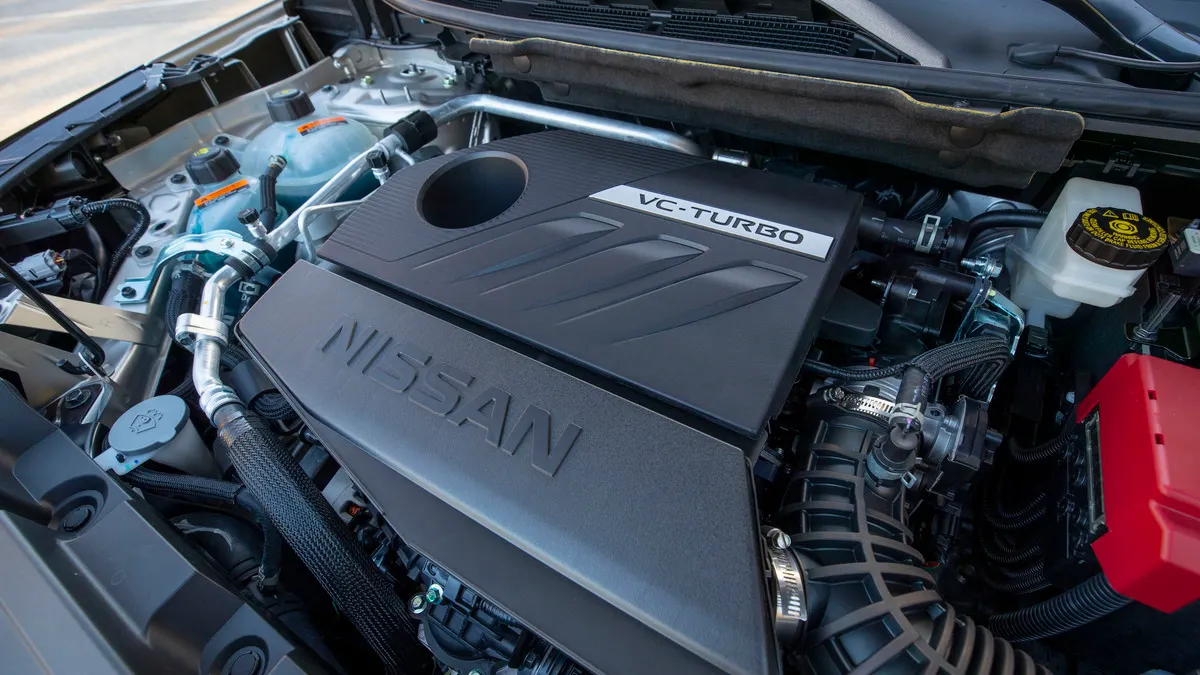Dive Brief:
- Nissan North America has recalled nearly 444,000 vehicles due to a manufacturing defect “in specific engine bearings or supporting engine components” that could lead to damage and/or engine failures, according to the National Highway Traffic Safety Administration.
- The recalled vehicles are equipped with 1.5L 3-cylinder or 2.0L 4-cylinder engines that feature the automaker’s variable compression turbo (VC-Turbo) technology. The models include the 2021-2024 Rogue SUV; 2019-2020 Altima sedan; 2019-2022 Infiniti QX50 crossover; and 2022 Infiniti QX55 crossover coupe.
- Dealers will inspect the engine oil pans of the vehicles for signs of metal debris, and repair or replace the engine as necessary if debris is present, free of charge. Owner notification letters are expected to be mailed Aug. 25.
Dive Insight:
According to the report, the engine bearing failures are not instantaneous and progress over time. Drivers of these vehicles would typically receive multiple forms of audible and visible advance warnings over time. Symptoms may also include abnormal noises from the engine compartment, rough running conditions, illumination of malfunction indicator lights or other warning messages in the instrument cluster.
An estimated 1.2% of the recalled vehicles equipped with 3-cylinder engines are suspected of having the engine manufacturing defects, and a majority of these recalled vehicles (348,554) are 2021-2024 Nissan Rogue models. For models with 4-cylinder engines, around 0.08% are estimated to have the defect.
The NHTSA’s Office of Defects Investigation opened a preliminary investigation of engine failures involving Nissan Rogues equipped with 3-cylinder engines on Dec. 13, 2023. The probe was launched after the agency identified six vehicle owner questionnaires and multiple field reports alleging engine failures, loss of motive power, engine knocking noise and/or metal debris in the oil pan.
Dealing with a major engine recall could be costly for Nissan, but the automaker aims to address some of the potential engine problems with a software update. Still, the remedy requires that hundreds of thousands of customers in the U.S. schedule a service appointment at a dealer for the initial inspection, the inconvenience of which could further impact Nissan’s brand reputation.
For customers with vehicles equipped with 3-cylinder 1.5L VC-Turbo engines, if no debris is detected in the oil during the inspection, dealers will replace the oil pan gasket, engine oil, and reprogram the vehicle’s engine control module. The repairs will be done at no cost and should take less than an hour to complete, according to the report.
For customers with Nissan vehicles equipped with 4-cylinder VC-turbo engines, dealers will replace the engine oil if no metal debris is detected.
However, if any of the recalled vehicles show signs of metal contamination in the oil, which will be confirmed by Nissan’s Powertrain Call Center, dealers will be instructed to replace the engine assembly at no charge. Engine replacement may take up to fifteen hours to complete, according to the recall report. Nissan dealers will be notified about the recall on July 15.
The recall is the second major powertrain recall in recent months by a major automaker, which collectively extend to over 1 million vehicles.
In April, General Motors recalled over 595,000 SUVs and pickups equipped with 6.2L V8 engines due to a manufacturing defect involving the connecting rod and/or crankshaft that can lead to catastrophic engine failures in some cases. The recall also followed a NHTSA investigation after the agency received numerous owner questionnaires from GM customers alleging engine failures.
The potentially costly recall comes as Nissan begins to execute its latest turnaround plan to return to profitability after a significant decline in sales in 2024, including a failed merger with Honda Motor Co. earlier this year.
In November 2024, Nissan announced it was cutting 9,000 jobs after posting a 90% year over year drop in operating profit in the first half of fiscal year 2024.
Earlier this year, Nissan’s failed merger with Honda led to the ousting of several top executives and appointment of new leaders to guide the company’s turnaround.
In May, Nissan announced a major cost-savings initiative that called for seven plant closures and slashing of another 11,000 jobs in an effort to generate $3.4 billion in savings as it looks to regain its footing.














